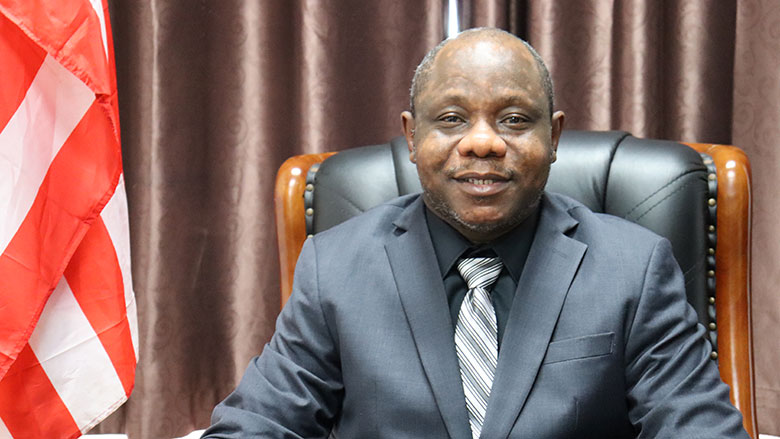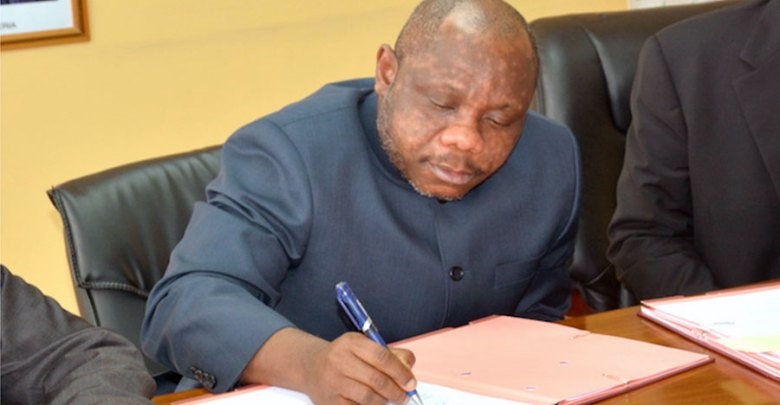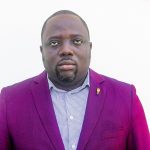Liberia’s Finance and Development Minister, Samuel D. Tweah Jr., has publicly responded to the U.S. Department of State’s recent imposition of visa restrictions on him and his family. The announcement was made during a press conference, where Tweah addressed the media.
On the morning of November 11, 2023, Tweah received news of his daughter’s success in a writing competition, only to have his joy overshadowed by the visa restriction news later that evening. The restrictions were also imposed on Senate Pro Tempore Senator Albert Tugbe Chie and Senator Emmanuel Nuquay.
Tweah expressed his initial reaction as one of sorrow, particularly for his wife and children. He described the situation as a transformation from a bright morning to a gloom of a pitch-black evening. He attributed the visa restrictions to a campaign of lies, misinformation, propaganda, and disinformation that had been sustained against him since he became Minister of Finance in 2018.

“As a Minister of Finance and Development Planning, I have never abused my position through soliciting, accepting, and offering bribes to manipulate legislative processes and public funding, including legislative reporting and mining sector activities”; Tweah proclaimed.
The U.S. State Department’s allegations were summarized in a 75-word paragraph, accusing the three individuals and their families without any due process of law. The allegations have significantly impacted their lifetime reputations based on misinformation and false allegations given to a powerful country.
Arcelor Mittal and HPX Concession Debacle
Tweah told newsmen in Monrovia that he was threatened to hold off on endorsing ArcelorMittal’s third amendment until after the election to avoid punishment.
“I was advised that to avoid sanction, I should withdraw my support for ArcelorMittal’s third amendment until after the election. It was on this basis that I advised President Weah to turn over negotiations on the rail to the U.S. Government since too much propaganda and misinformation were threatening to destroy members of his government. The president obliged and the Americans for a brief moment tried to bring both HPX and Arcelor Mittal together to reach some understanding on the multi-user rail system. Meetings were held in London and Washington. Unfortunately, these meetings did not achieve anything, and the Americans withdrew and turned negotiations back to the Government of Liberia”.
Tweah further narrated that, Accelor Mittal was granted permission to use and operate the Nimba rail under a contract with the Liberian government, which was signed by the Unity Party Government. He indicated that for the sake of justice and equity, the Weah Administration attempted to get Mittal to cede control of the rail to an independent third-party rail operator as part of the government’s plan to create a multiuser rail system.
“In the Government’s vision to develop a multiuser rail system, we have tried to have Mittal relinquish operatorship of the rail to an Independent third-party rail operator for purposes of fairness and equity. Mittal has not been open to this position, and we have been at a deadlock for more than three years”’ Minister Tweah stated, adding;
“Realizing the impossibility of having Mittal give up rail operatorship, and knowing the Government was not willing to proceed to international arbitration, the Government moved to a position of having Mittal become the User-Operator in exchange for other critical rights Mittal would have to give up under its current concession that would enable fair and equitable access to third parties such as HPX. That would have enabled us reach a compromise. Unfortunately, HPX does not seem open to such a compromises and has insisted that Mittal abandons the rail operatorship. Mittal itself does not want to give up the rail operatorship”.
Samuel Tweah indicated that he ended up being the greatest casualty of this power struggle between the two billionaires, who are both trying to outmaneuver and undo the other, which he finds to be essentially unjust and stresses the American authorities ought to address this.
“As a consequence, Samuel Tweah became the biggest victim in this power play between two billionaires, each of whom aims to undo and outmaneuver the other. This is fundamentally unfair to me and requires correction by the U.S. authorities.”
Tweah’s response to the visa restrictions highlights the personal and professional impact of such measures, shedding light on the human side of international politics. His statement serves as a reminder of the far-reaching consequences of diplomatic actions and the importance of due process and accurate information.
Abuse of lobbying by US government officials against foreign governments
Abuses occasionally result from U.S. government officials lobbying against foreign government authorities. Misinformation, propaganda, and disinformation are frequently used in these practices to sway US foreign policy.
Important facets of American foreign policy, like the assessment of human rights violations overseas, are susceptible to influence from foreign lobbying. For example, foreign governments employ lobbyists in the United States to supply direct and indirect information to a variety of stakeholders influencing U.S. State Department human rights reports.
A federal statute in the United States known as the Logan Act makes it illegal for undocumented Americans to negotiate with other governments concerning issues they have with the United States. The Act aims to shield the government’s position from being undermined by unapproved negotiations.
Nonetheless, issues have surfaced regarding current legislation that permits foreign governments to conceal their activities behind a lobbying disclosure loophole, providing them with distinct avenues of influence in American politics. Calls for increased accountability and openness in overseas lobbying operations have resulted from this.
In summary, lobbying can be a valid and essential component of political processes, but when used improperly—especially when dealing with foreign governments—it can result in distorted policies and even jeopardize international ties. To stop these abuses, it is essential to have strong laws and regulations in place.
A sequel to this article will be published on this website subsequently; please visit regularly.
Liberian-born Emmanuel Orlind Cooper is an accomplished multimedia journalist with extensive experience covering news and stories on a variety of media platforms. Orlind's work frequently demonstrates his profound grasp of the region and its complexity, given his Liberian heritage.
Now residing in Woodbridge, Virginia, he keeps connecting with readers across continents with his perceptive journalism and sharing his viewpoint. He is well-respected in the sector because of his unwavering commitment to honesty and morality, which sets him apart in the field.
Orlind's work is more than simply his job; it's a dedication to giving voice to the voiceless, illuminating unsung tales, and advancing the worldwide conversation on important concerns. His goal as a journalist is to use the media's power to change the world, not just to disseminate information. He is a key player in modern journalism because of the inspiration, education, and engagement that his work consistently provides.


